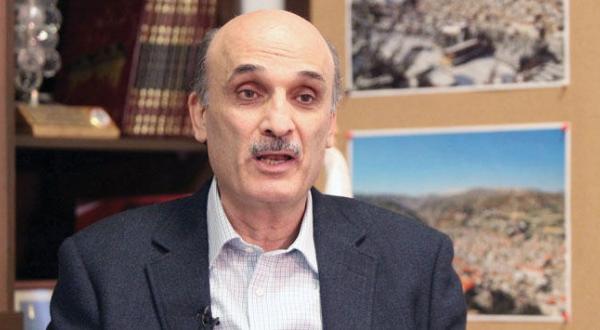Beirut-The Executive Chairman of the Lebanese Forces, Samir Geagea, summoned the so-called “sovereign party” in the Lebanese government to meet and put a strategy to face Hezbollah, which has dropped self-distancing to attack Gulf States militarily, politically, and through media. He said that the government should demand the withdrawal of Hezbollah from the region’s crises stressing that those who cannot hold responsibility in the government should willingly quit.
In his statements to Asharq Al-Awsat, Geagea confirmed that the relation between the Gulf States and Lebanon goes beyond financial matters and includes the Lebanese collective consciousness. He added that these countries didn’t ask Lebanon to fight Iran, but to self-distance itself; however, Hezbollah opted for the opposite direction and the government did nothing about it.
Geagea confirmed that Aoun’s chances to become a president have not vanished, saying that it would be the only way to solve the presidential vacancy.
He commented on the latest decision issued by Saudi Arabia on Lebanon saying: “I am usually an optimistic person, but the situation is complicated and is becoming more complicated with time.”
“What is important now is not to give up and to try as much as we can to solve this problem,” he added.
Geagea also said: “Away from this chaos, Saudi Arabia and the other Gulf States are major supporters for Lebanon and have always been since the independence. These countries have become part of the Lebanese collective consciousness.”
According to Geagea, “the economic factor is important and the financial aids have an assistive role; however, bilateral relations that surpass political and economic interests remain crucial.” He compared Lebanon’s current relation with the Gulf States to that with France in the past.
Geagea summarized the crisis saying that, “Lebanon, for the first time in its history, decided to distance itself from the self-distancing policy. In the meantime,
Gulf States, Saudi Arabia and other Arab countries are going through a comprehensive confrontation with Iran. And despite Lebanon being a member of the Arab League, the Gulf States didn’t ask Lebanon to choose between Saudi Arabia and Iran; all what they asked was the adoption of its regular self-distancing policy in the conflict with Iran. Nevertheless, the only party in Lebanon that decided to evade the self-distancing policy was Hezbollah, and it did that with the wrong country. Therefore, we understand the drastic measures taken by Saudi Arabia and the other Gulf States towards Lebanon.”
When asked about a possible solution for this crisis, Geagea replied: “Generalities do not fall under strategies. The Lebanese government should, at least, request the withdrawal of Hezbollah from the regional crises.”
“Hezbollah is undeniably participating in the Syrian war and has to do with what is happening in Iraq, Bahrain, Yemen, and Kuwait, in addition to its role in the Eastern region in Saudi Arabia,” he added.

